Resources
Innovation Center State-Based Initiatives: A Systematic Review of Lessons Learned
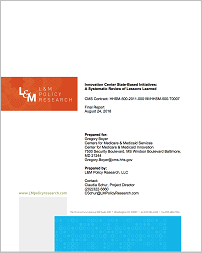
This Centers for Medicare & Medicaid Services and Center for Medicare & Medicaid Innovation report offers lessons learned from a systematic review of cross-sector models.
The review includes 47 evaluation reports covering 12 models categorized into three groups, based on the state’s primary role (Tier 1: strong state role; Tier 2: Medicaid-focused; and Tier 3: other state role).
Cross-Sector Innovation Initiative: Environmental Scan Full Report
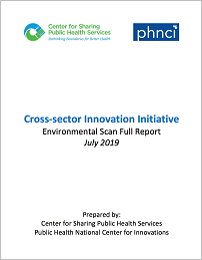
The Center for Sharing Public Health Services and the Public Health National Center for Innovations conducted a field scan of cross-sector collaboratives.
The report, released in July 2019, includes a continuum of collaboration (using Himmelman’s framework), roles within collaborations, and factors that may facilitate or impede collaboration. Information on the impacts associated with cross-sector collaboration and future areas of research are presented.
Elements of Accountable Communities for Health: A Review of the Literature
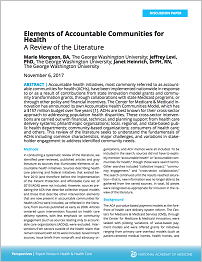
Researchers from the Milken Institute School of Public Health at George Washington University catalogue and characterize real-world efforts to develop multisector approaches to improving population health through value-based systems, specifically Accountable Communities of Health. This research, published in the National Academy of Medicine, highlights some of the major challenges such efforts face.
Accountable Communities for Health: Opportunities and Recommendations
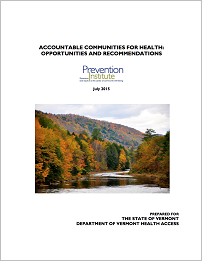
Researchers from the Prevention Institute review on-the-ground efforts to develop cross-sector efforts focused on improving Triple Aim outcomes through value-based systems, specifically Accountable Communities of Health (ACH). The resource identifies common themes and offers recommendations for organizations looking to develop and apply the ACH model.
Pathways to System Change: The Design of Multisite, Cross-Sector Initiatives
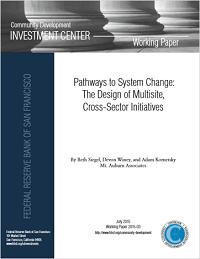
Researchers on behalf of the Robert Wood Johnson Foundation and Federal Reserve Bank of San Francisco present insights on “what works” and “pitfalls” in an analysis of design elements and project parameters of past and current multisite, cross-sector initiatives to improve communities and the lives of their residents.
The framework developed for the research focuses on some of the overarching choices that funders need to make when designing an initiative.
Cross-Sector Collaborations and Partnerships: Essential Ingredients to Help Shape Health and Well-Being
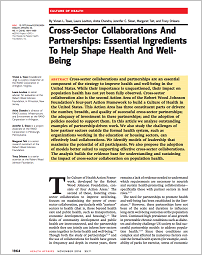
Researchers with the Robert Wood Johnson Foundation and the RAND Corporation offer their take on effective models for cross-sector collaborations and partnerships, with special attention on organizations outside of the formal health care system. This article, published in Health Affairs, analyzes examples of partnership-driven work and identifies challenges faced by partner sectors.
Integrating Social and Medical Care: Could It Worsen Health and Increase Inequity?
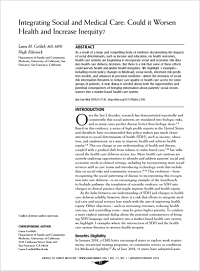
Researchers from the University of California, San Francisco Department of Community and Family Medicine point out that collecting information about the social determinants of health for consumers may help or hurt depending on how the information is used.
Examples, published in Annals of Family Medicine, are provided for how this information can be used to the detriment of consumers and what different parties can do to see that social determinants information is used to promote health and health equity.
Changes in State Technical Assistance Priorities and Block Grant Funds for Addiction After ACA Implementation
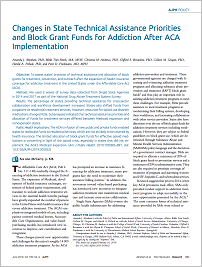
Researchers from the University of Georgia, University of Chicago, University of South Carolina, University of Hawai’i, and University of Massachusetts Medical School demonstrate that policy can strengthen cross-sector collaborations and change health systems, but the changes may not always be what is expected or desired. Full research findings are available in this article published in the American Journal of Public Health.
Results of Preventable Death Rates Fell Where Communities Expanded Population Health Activities Through Multisector Networks
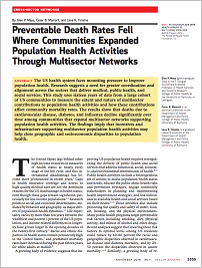
A research team at the University of Kentucky College of Public Health demonstrates that more expansive connections between organizations concerned with population health are associated with improved public health outcomes.
This study, published in Health Affairs, uses 16 years of data from a large cohort of U.S. communities to measure the extent and nature of multisector contributions to population health activities and how these contributions affect community mortality rates.
Examining Whether the Health-In-All-Policies Approach Promotes Health Equity
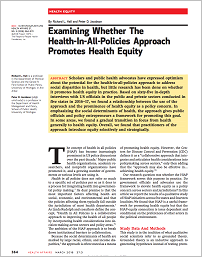
Based on in-depth interviews with U.S. officials in the public and private sectors conducted in five states from 2016 to 2017, researchers from the University of Michigan School of Public Health suggest that the Health-in-All-Policies approach promotes health equity as a policy concern but that discourse on health equity is neither comprehensive nor always effective in this Health Affairs article.
